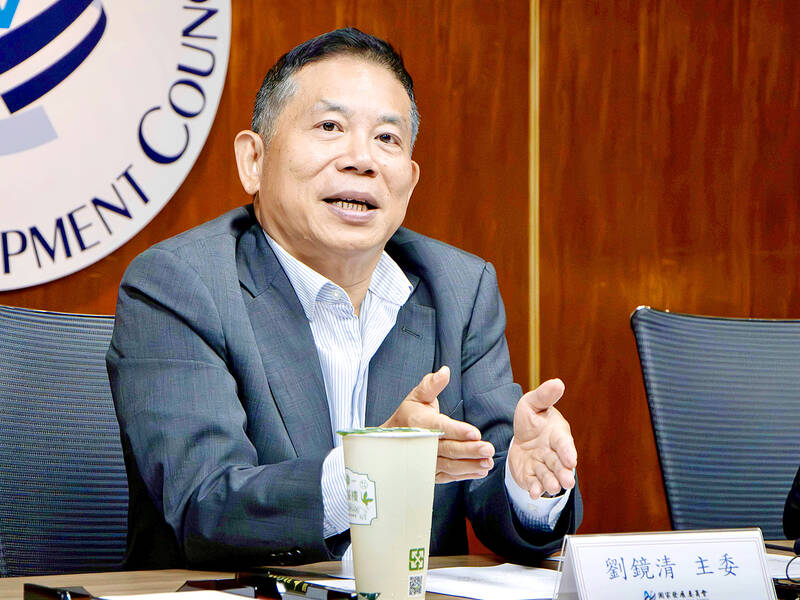Artificial intelligence (AI) has become a second economic pillar for Taiwan, after the booming semiconductor industry, National Development Council (NDC) Minister Paul Liu (劉鏡清) told an informal meeting with media on Tuesday.
"Taiwan doesn’t just have one ’huguo shenshan’ (sacred mountain protecting the nation), there is now also a second," Liu said.
Taiwan’s powerful semiconductor industry is often referred to as a "huguo shenshan" protecting it because the country produces more than 90 percent of the world’s high-end chips.

Photo courtesy of National Development Council
Noting that Taiwan is already a global AI hub with a significant global AI server market share, the entrepreneur-turned minister said he hopes Taiwan’s position in the global AI supply chain will be cemented through advancing AI hardware development, such as key components, cooling systems and processors.
Liu, who assumed office on Monday last week, said the NDC aims to help Taiwanese companies in the AI sector increase their overall global market share from just over 12 percent to 30 percent.
With semiconductors and AI as the dual cores of Taiwan’s economy, Liu pledged that the council would work with relevant government agencies to attract investment capital and talent to help these two industries develop.
Regarding income inequality in Taiwan, Liu said that if industries successfully shift to high-value operations, high-paying jobs and higher salaries will follow.
He pointed out that while about 60 percent of the country’s workforce is employed in the services industry, there are no world-renowned Taiwanese companies in the sector.
Therefore he proposed several strategies to boost the industry, including leveraging AI to enhance IT services. Liu also suggested integrating services across sectors through digitization and establishing holding companies to facilitate expansion into world markets.
Turning to Taiwan’s pathway to net-zero emissions in 2050, Liu said he was upbeat about the development of "turquoise hydrogen" to help lower carbon emissions, given that Academia Sinica has developed a new method of using natural gas decomposition to produce it.
Turquoise hydrogen, also known as low-carbon hydrogen, is a new method of producing hydrogen that results in significantly lower carbon emissions compared to traditional methods.
Liu explained that he will meet with experts from the institute on June 6 and that the goal is to commercialize the technology in the next three to five years.
Liu also said the government will also strive to reduce carbon emissions by promoting the Taiwan Renewable Energy Certificate (T-REC) system and green electricity trading.

TAKING STOCK: A Taiwanese cookware firm in Vietnam urged customers to assess inventory or place orders early so shipments can reach the US while tariffs are paused Taiwanese businesses in Vietnam are exploring alternatives after the White House imposed a 46 percent import duty on Vietnamese goods, following US President Donald Trump’s announcement of “reciprocal” tariffs on the US’ trading partners. Lo Shih-liang (羅世良), chairman of Brico Industry Co (裕茂工業), a Taiwanese company that manufactures cast iron cookware and stove components in Vietnam, said that more than 40 percent of his business was tied to the US market, describing the constant US policy shifts as an emotional roller coaster. “I work during the day and stay up all night watching the news. I’ve been following US news until 3am

UNCERTAINTY: Innolux activated a stringent supply chain management mechanism, as it did during the COVID-19 pandemic, to ensure optimal inventory levels for customers Flat-panel display makers AUO Corp (友達) and Innolux Corp (群創) yesterday said that about 12 to 20 percent of their display business is at risk of potential US tariffs and that they would relocate production or shipment destinations to mitigate the levies’ effects. US tariffs would have a direct impact of US$200 million on AUO’s revenue, company chairman Paul Peng (彭雙浪) told reporters on the sidelines of the Touch Taiwan trade show in Taipei yesterday. That would make up about 12 percent of the company’s overall revenue. To cope with the tariff uncertainty, AUO plans to allocate its production to manufacturing facilities in

Six years ago, LVMH’s billionaire CEO Bernard Arnault and US President Donald Trump cut the blue ribbon on a factory in rural Texas that would make designer handbags for Louis Vuitton, one of the world’s best-known luxury brands. However, since the high-profile opening, the factory has faced a host of problems limiting production, 11 former Louis Vuitton employees said. The site has consistently ranked among the worst-performing for Louis Vuitton globally, “significantly” underperforming other facilities, said three former Louis Vuitton workers and a senior industry source, who cited internal rankings shared with staff. The plant’s problems — which have not

COLLABORATION: Given Taiwan’s key position in global supply chains, the US firm is discussing strategies with local partners and clients to deal with global uncertainties Advanced Micro Devices Inc (AMD) yesterday said it is meeting with local ecosystem partners, including Taiwan Semiconductor Manufacturing Co (TSMC, 台積電), to discuss strategies, including long-term manufacturing, to navigate uncertainties such as US tariffs, as Taiwan occupies an important position in global supply chains. AMD chief executive officer Lisa Su (蘇姿丰) told reporters that Taiwan is an important part of the chip designer’s ecosystem and she is discussing with partners and customers in Taiwan to forge strong collaborations on different areas during this critical period. AMD has just become the first artificial-intelligence (AI) server chip customer of TSMC to utilize its advanced